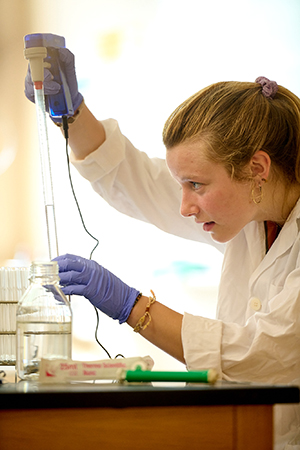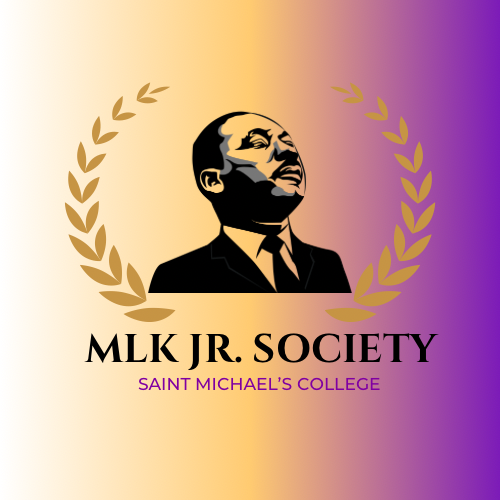Biology honor society’s grant advances research by St. Mike’s student
Emilie Webster excited to continue exploring interesting questions on antibiotics, bacteria and their 'pumps' with guidance from Professor Podnecky and support from other faculty mentors

Emilie Webster in a Saint Michael’s science lab where she does research. In the large photo behind the headline, another summer researcher, Otto VanDerhoef ’22 is visible at left.
An average summer day for Emilie Webster ‘23 this year was not typical among her peers. For four to five hours a day, Webster spent her summer days “solubilizing antibiotics, pipetting antibiotics into well plates, and learning the importance of maintaining sterility when experimenting with bacteria such as E. coli.”
Webster, a biology major from New London, N.H., with minors in chemistry and Spanish, is interested in alternatives to antibiotic therapy; so, with the help of a summer research stipend from Saint Michael’s, she explored “how the expression of efflux pumps affects susceptibility to antibiotics in E. coli.” Efflux pumps, she explained, exist on the cell membrane to push potentially toxic substances out; bacteria will prevent themselves from being affected by antibiotics by pumping out the antibiotics through these “pumps.” E. Coli is a common bacteria that normally lives in the intestines of healthy people and animals.
Her focus began when Webster learned about research by Nicole Podnecky, Saint Michael’s assistant professor of biology, for the professor’s postdoctoral fellowship investigating the effects of and resistances to various drug combinations with bacteria. Webster noticed that a “limitation” of the research that Podnecky notes in her research mentioned efflux pumps. Declan McCabe of the biology faculty explained that in science research, a “limitation” refers to the fact that most science research uses systems “that might be great for looking at the one particular thing they are designed to investigate, but may not be as useful in substantially furthering understanding on another closely related thing.” For Podnecky’s postdoctoral work, the pumps were one topic that appeared relevant and of interest in her area of study, yet was less fully explored in her system.
After reading this limitation, Webster felt inspired to cultivate her own research on efflux pumps. She said Podnecky’s research focused on “collateral sensitivities and cross resistance,” which refers to the use of different drugs together and the examination of the resistance or the susceptibility of the bacteria to them.
This summer, Webster focused on specific genes in bacteria that will express efflux pumps called knockouts. She made sure she had different strains of E. coli with different knockouts. Once she acquired her materials, she had to prepare all the antibiotics by turning them from solid form to liquid. Then, she began testing the antibiotics with the different strains of E. coli. After she completed her testing, Webster saw how different antibiotics affected different strains. Some strains would have higher susceptibility to different antibiotics. With these observations, she was able to conclude that if one drug was not working, then the E. coli was possibly more resistant to it, indicating that another drug might be a better treatment.

Performing a lab procedure.
This semester, Dagan Loisel, associate professor of biology and faculty adviser of Tri-Beta, the national biology honor society, informed members of a research grant available to students in the society could apply. Webster said she knew instantly that she should apply to be able to continue her research into the spring. By November, she was ecstatic to find out that the society accepted her research proposal, granting her $800 for supplies and consumables to continue her work. As one out of three students in Saint Michael’s history to receive the grant, Webster is proud of the work she has done and continues to do.
In the spring Webster plans to investigate whether efflux pumps for these certain genes are being overexpressed (meaning more pumps on the cell membrane). “The question I’ll be asking is ‘what is the reverse of that going to look like and how are the sensitivities and resistances to these antibiotics going to change,’” said Webster.
She looks forward to working more with Podnecky through her continuation of her research. Webster said that in the summer, Podnecky was a great mentor in discussing and cultivating her research; she looks forward to expanding that relationship more in the spring. She also gives thanks to Dagan Loisel, for introducing her to the grant, and to David Heroux from the chemistry department for allowing her to borrow some supplies necessary for solubilizing antibiotics.
While Webster’s research is still in the works, she hopes conclusions she draws will be profound and helpful. “If anything, I just hope that [my research] contributes to the microbiology field in some way,” said Webster. The summer research program at Saint Michael’s has helped Webster explore and make a difference in her fields of interest.
“I am very interested in healthcare,” she said. “I do Rescue for Saint Michael’s Fire and Rescue, so I have that experience already. I do think it’s really beneficial to have this background if I end up going into the healthcare field.”
Webster said appreciates Saint Michaels’ research program and Tri-Beta’s grant award for allowing her to enhance her experience in these fields, while also drawing important research conclusions for microbiology and healthcare.






